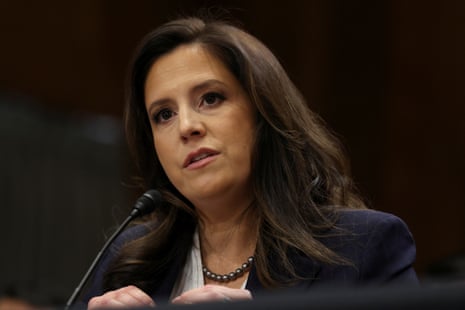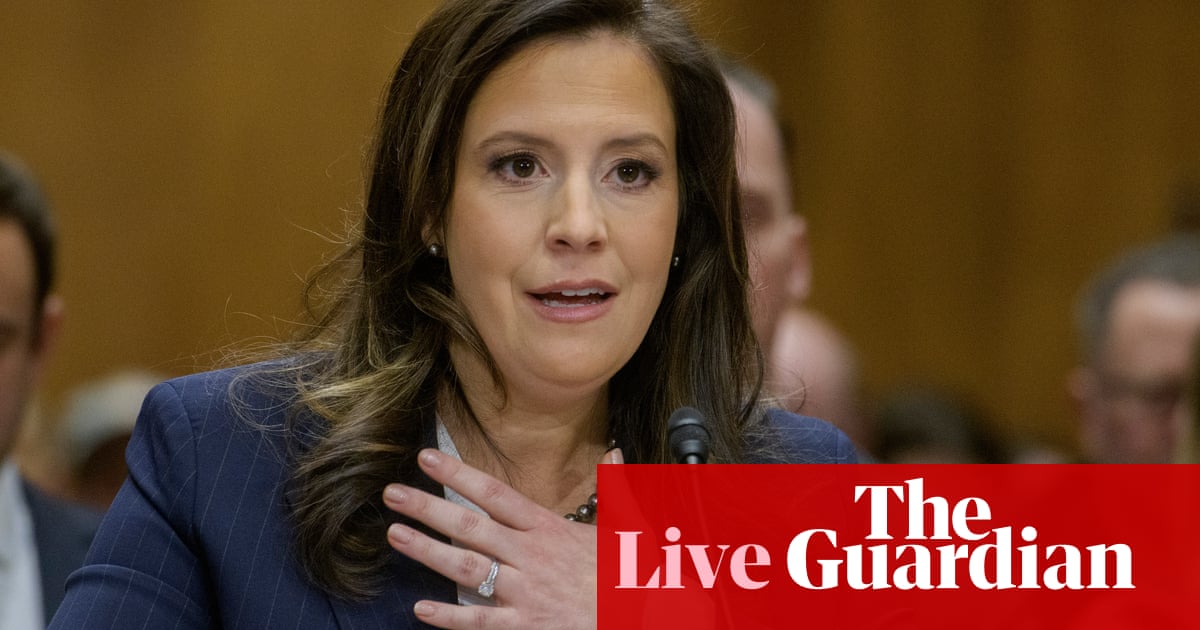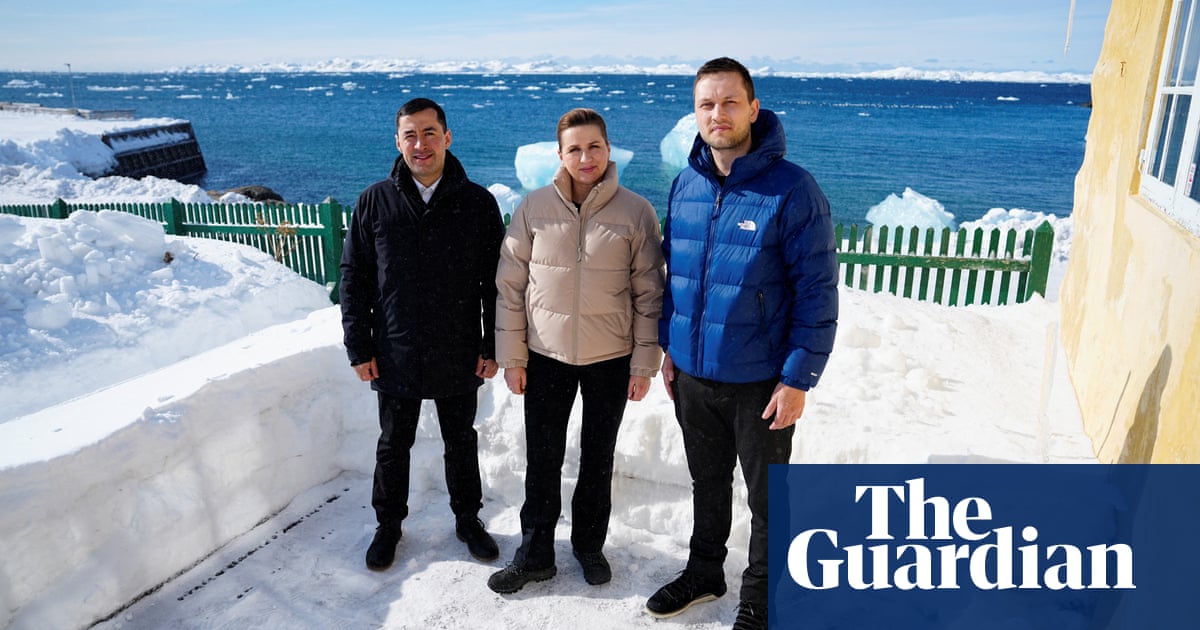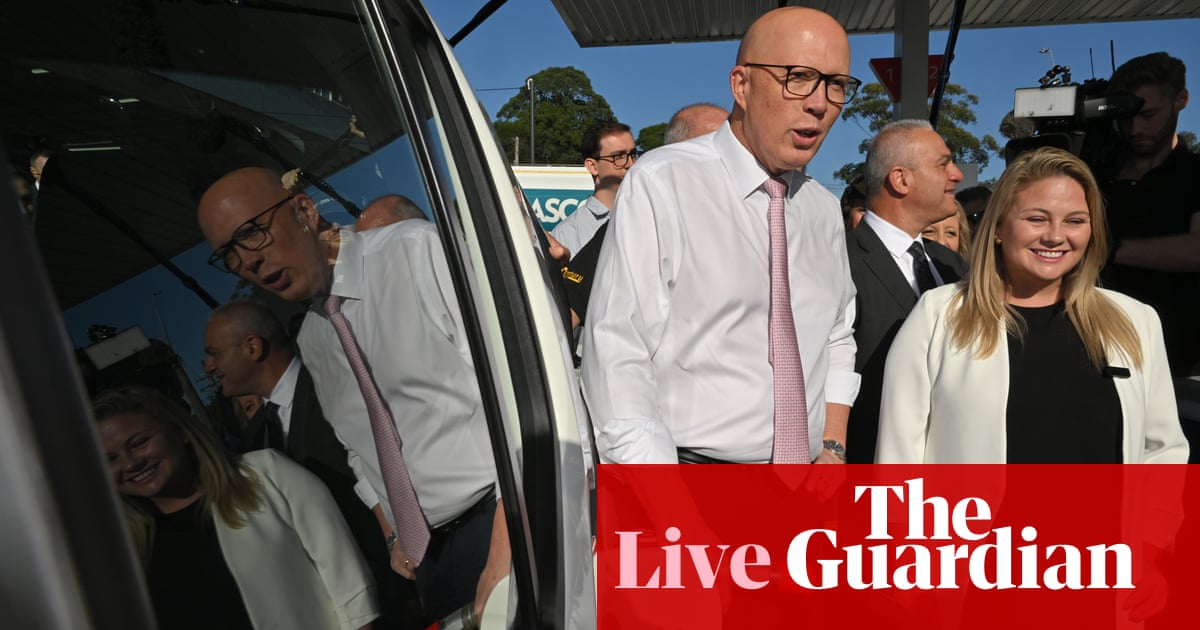US nominee for UN envoy affirms support for Israeli claims of biblical rights to West Bank
Joseph Gedeon
New York representative Elise Stefanik, the US president Donald Trump’s nominee for UN ambassador, expressed support for Israeli claims of biblical rights to the entire West Bank during a tense confirmation hearing exchange.
Maryland senator Chris Van Hollen confronted Stefanik about her agreement of a position that aligns her with the Israeli far-right, including the Israeli finance minister, Bezalel Smotrich, and former national security minister Itamar Ben-Gvir derived from a private conversation ahead of the hearing.
“You told me that, yes, you shared that view,” Van Hollen said during questioning. “Is that your view today?”
“Yes,” Stefanik said.

The hearing remains heavily focused on the UN’s stance on Israel, with this particular exchange a clear example on how Stefanik’s stance might affect US diplomatic efforts during ongoing conflicts in the Middle East, particularly regarding Palestinian self-determination and territorial disputes.
Still, Van Hollen warned that such positions could hamper peace negotiations.
“It’s going to be very difficult to achieve peace if you continue to hold the view that you just expressed,” he said.
Key events
Summary of the day
It’s 9pm in Tel Aviv, Gaza and Jenin. Here’s a recap of the latest developments:
-
The UN’s secretary general, António Guterres, called on Israel’s security forces to exercise “maximum restraint” after a major Israeli military operation in the West Bank city of Jenin. The UN chief “remains deeply concerned” about the violence and “urges security forces to exercise maximum restraint and use lethal force only when it is strictly unavoidable to protect life,” a spokesperson for Guterres said.
-
At least eight Palestinians were killed and 35 people were injured during the Israeli operation in Jenin, according to the Palestinian health ministry. Three nurses and two doctors were also injured by Israeli fire during the military operation, which took place as the Gaza ceasefire entered a third day, the director of Khalil Suleiman hospital in Jenin said.
-
Israel’s prime minister, Benjamin Netanyahu, said the Jenin operation was “another step towards achieving the goal we set – strengthening security in Judea and Samaria”. He said it included police, military and the Shin Bet internal intelligence agency. Jenin has been a focus of Israeli raids into the occupied West Bank throughout the 15-month war in Gaza. The Palestinian health ministry says more than 800 people have been killed in Israeli raids since October 2023.
-
Israel’s top general Lt Gen Herzi Halevi resigned as the chief of staff of the Israel Defense Forces (IDF) on Tuesday. He cited the “terrible failure” of security and intelligence related to Hamas’s surprise attack on Israel on 7 October 2023 that triggered the war in Gaza. The Israeli opposition leader, Yair Lapid, said he saluted Halevi’s decision and also called on Netanyahu and his government to resign. Maj Gen Yaron Finkelman, the head of Israel’s Southern Command, which oversees operations in Gaza, also tendered his resignation on Tuesday.
-
Hamas said four more female Israeli hostages will be freed this weekend in return for Palestinian prisoners. The next group of hostages due to be released is expected to include captured female Israeli soldiers, who will be exchanged for Palestinian prisoners serving more lengthy sentences who are being held in Israeli jails, some of whom will be deported to third countries.
-
The new US president, Donald Trump, said he was not confident that the ceasefire deal that he personally insisted on would hold. “It’s not our war, it’s their war,” Trump said during the signing of a tranche of executive orders after his inauguration on Monday. “But I’m not confident. But I think they’re very weakened on the other side.”
-
Trump, during his first day back in the White House, revoked the sanctioning of Israelis seen as being involved in violent settler activity. “Lifting sanctions on extremist settlers encourages them to commit more crimes against our people,” the Palestinian foreign ministry said in a statement. Even before Trump’s decision had been made public, Israeli settlers attacked the Palestinian villages of Al-Funduk and Jinsafut in the north of the West Bank on Monday night.
-
Trump also reinstated an executive order allowing him to impose economic sanctions against the international criminal court (ICC). Among the blizzard of executive orders made on Monday evening, Trump revived an order issued during his presidency that used emergency powers to create a sanctions regime targeting the court, paving the way for the US to hit the judicial body and its staff with draconian measures.
-
Trump’s pick for UN ambassador, New York congresswoman Elise Stefanik, expressed support for Israeli claims of biblical rights to the entire West Bank. Stefanik’s comments, made during a tense confirmation hearing exchange, show how her stance might affect US diplomatic efforts during ongoing conflicts in the Middle East, particularly regarding Palestinian self-determination and territorial disputes.
-
The UK prime minister, Keir Starmer, held a call with his Israeli counterpart, Benjamin Netanyahu. No 10 said Starmer told Netanyahu that he peace process in the Middle East should pave the way for a “viable and sovereign” Palestinian state. An Israeli readout of the call said Starmer faced pressure from Netanyahu over frozen arms sales to Israel.
-
The west should seize the opportunity to target the Tehran-backed Houthi leadership in Yemen while the Iranian government is weakened, the vice-president of the UN-backed government in Aden, Aidarus al-Zoubaidi, has said. Iran’s reverses in Lebanon, Syria and Gaza had left the country “massively weakened”, he said, adding: “Now is the time to counter the Houthis and push them back into their position.”
UN chief urges ’maximum restraint’ after Israeli forces launch West Bank operation
The UN’s secretary general, António Guterres, has called on Israel’s security forces to exercise “maximum restraint” after they launched a major operation in the West Bank city of Jenin.
At least eight Palestinians were killed and 35 people were injured, according to the Palestinian health ministry.
Three nurses and two doctors were also injured by Israeli fire during the military operation, which took place as the Gaza ceasefire entered a third day, the director of Khalil Suleiman hospital in Jenin said.
The UN chief “remains deeply concerned” about the violence and “urges security forces to exercise maximum restraint and use lethal force only when it is strictly unavoidable to protect life,” a spokesperson for Guterres said.
Palestinian officials have criticised the decision by the US president, Donald Trump, to lift sanctions on violent Israeli settlers in the occupied West Bank, following a spate of recent attacks.
As we reported earlier, Trump rescinded sanctions imposed by the former Biden administration on far-right Israeli settler groups and individuals for allegedly committing violence against Palestinians.
“Lifting sanctions on extremist settlers encourages them to commit more crimes against our people,” the Palestinian foreign ministry said in a statement.
Even before Trump’s decision had been made public, Israeli settlers attacked the Palestinian villages of Al-Funduk and Jinsafut in the north of the West Bank on Monday night, AFP reported.
About 50 people set fire to homes and shops, destroyed vehicles and “terrorised unarmed civilians”, resulting in at least 21 people injured in attacks that took place “under the supervision and protection of the Israeli army and political leadership,” the Palestinian ministry said.
The Israeli military confirmed the incidents had taken place, saying it had “dispersed riots” in the vicinity of Al-Funduk and that Israeli civilians had “thrown stones and attacked the security forces”.
On the first morning of the first day after the ceasefire, the market of Asdaa camp, a sprawling area of tents and makeshift shelters on the central Gaza coast, was busy.
Some shoppers had come because prices of the small range of basic necessities available had dropped since the ceasefire was declared, making once prohibitively expensive items just about affordable.
Others came simply because they could now stand and talk and buy what they needed without fearing sudden death or mutilation.
Ahmad Al-Amarna, a 25-year-old stall holder, said he was happy because the ceasefire had brought “stability, lower prices and the end of the killings”. He said;
I am very happy that prices have dropped, and now people can buy things they had wished for but couldn’t afford before.
But if Sunday’s ceasefire has brought some relief, life for survivors of the war remains extremely hard. Health services have been decimated and swaths of the territory reduced to rubble. Water and fuel are scarce. Humanitarian officials have called for a “surge of aid” to stave off disease and potential famine.
We reported earlier that the UK prime minister, Keir Starmer, held a call with his Israeli counterpart, Benjamin Netanyahu, earlier today.
During the call, Starmer faced pressure from Netanyahu over frozen arms sales to Israel, according to a readout by the Israeli foreign affairs ministry.
The Israeli leader “raised the issue of the weapons export licences to Israel that have been frozen in the UK,” it said. ““Prime Minister Starmer said that an evaluation of the issue is being carried out.”
The UK government has suspended about 30 arms export licences for items used in Gaza by the Israel Defense Forces (IDF).
Downing Street’s readout of the call did not include reference to the suspended arms licences.
Press Association reports that a No 10 spokesperson could not say whether the ceasefire may lead to a change in the UK government‘s position on the suspended licences. They said:
We’ve been consistent in saying that we keep these things under review. Clearly, the maintenance of that ceasefire is a priority.
Israel’s defence minister, Israel Katz, said he will begin interviewing candidates for the chief of staff of the Israel Defense Forces (IDF) in the coming days after the resignation of Lt Gen Herzi Halevi.
The Times of Israel reports Katz saying:
It is of utmost importance to choose the most suitable candidate to lead the IDF in this challenging period and I intend to have an orderly and fast procedure for choosing the candidate for the position of the next chief of staff.
The IDF is the “people’s army” and has been entrusted with the “ultimate responsibility of preserving the lives of soldiers and protecting the State of Israel”, he said.
US nominee for UN envoy affirms support for Israeli claims of biblical rights to West Bank
Joseph Gedeon
New York representative Elise Stefanik, the US president Donald Trump’s nominee for UN ambassador, expressed support for Israeli claims of biblical rights to the entire West Bank during a tense confirmation hearing exchange.
Maryland senator Chris Van Hollen confronted Stefanik about her agreement of a position that aligns her with the Israeli far-right, including the Israeli finance minister, Bezalel Smotrich, and former national security minister Itamar Ben-Gvir derived from a private conversation ahead of the hearing.
“You told me that, yes, you shared that view,” Van Hollen said during questioning. “Is that your view today?”
“Yes,” Stefanik said.
The hearing remains heavily focused on the UN’s stance on Israel, with this particular exchange a clear example on how Stefanik’s stance might affect US diplomatic efforts during ongoing conflicts in the Middle East, particularly regarding Palestinian self-determination and territorial disputes.
Still, Van Hollen warned that such positions could hamper peace negotiations.
“It’s going to be very difficult to achieve peace if you continue to hold the view that you just expressed,” he said.
Saudi Arabia’s foreign minister, Prince Faisal bin Farhan al Saud, said he did not see Donald Trump’s new administration increasing the risk of an Israel-Iran conflict.
Speaking in Davos on Tuesday, Prince Faisal said he hoped the new US president’s approach to Iran would be met with a willingness by Tehran to positively engage with the US dministration and address the issue of its nuclear programme, Reuters reported.
“Obviously a war between Iran and Israel, any war in our region is something we should try to avoid as much as possible,” he said.
I don’t see the incoming US administration as contributory to the risk of war, on the contrary, President Trump has been quite clear he does not favour conflict.

Harry Davies
Donald Trump has reinstated an executive order allowing him to impose economic sanctions against the international criminal court (ICC), paving the way for the US to hit the judicial body and its staff with draconian measures.
Among the blizzard of executive orders made on Monday evening, Trump revived an order issued during his presidency that used emergency powers to create a sanctions regime targeting the court.
The powers were used in 2020 to impose asset freezes and travel bans against the ICC’s former chief prosecutor, Fatou Bensouda, and one of her top officials. The order was revoked in April 2021 by Joe Biden.
Trump’s reinstatement of the order comes as the ICC braces itself for a volley of aggressive sanctions by the new US administration in response to arrest warrants it has issued against Israeli prime minister, Benjamin Netanyahu, and his former defence minister.
The Guardian reported on Monday the court is planning for a worst case scenario in which the US imposes sanctions against the institution in addition to measures targeting senior figures including its judges and current chief prosecutor Karim Khan.
Starmer tells Netanyahu peace process ‘should lead to viable Palestinian state’
The UK prime minister, Keir Starmer, spoke with Israel’s prime minister, Benjamin Netanyahu, on Tuesday during which he said the peace process in the Middle East should pave the way for a Palestinian state, Downing Street said.
Starmer personally thanked Netanyahu for the Israeli government’s work to secure the release of the hostages, including British hostage Emily Damari, according to a readout of the call by No 10.
To see the pictures of Emily finally back in her family’s arms was a wonderful moment but a reminder of the human cost of the conflict, [Starmer] added.
Starmer then “reiterated that it was vital to ensure humanitarian aid can now flow uninterrupted into Gaza, to support the Palestinians who desperately need it,” it said.
Both agreed that we must work towards a permanent and peaceful solution that guarantees Israel’s security and stability. The prime minister added that the UK stands ready to do everything it can to support a political process, which should also lead to a viable and sovereign Palestinian state.
Summary of the day so far
At least eight people have been killed and more than 30 wounded in an Israeli raid on Jenin in the occupied West Bank. Here’s what else has happened today:
-
Israel’s top general, Lt Gen Herzi Halevi, has resigned citing the security failures linked to the 7 October attack. The IDF’s head of southern operations, Maj Gen Yaron Finkelman, also said he would be stepping down.
-
US President Donald Trump has reversed the Biden administration’s sanctions on violent Israeli settlers in a concession to Israeli prime minister Benjamin Netanyahu.
-
Hamas have confirmed that four female Israeli hostages will be freed on Saturday in return for the release of Palestinian prisoners. the second such move under the ceasefire deal.
-
Displaced Palestinians continued to return to their homes in Gaza, across a territory that lies in ruins. The search for bodies buried under the rubble has started with Gaza’s civil defence agency saying its workers dug up 66 bodies in Gaza yesterday.
Qatar’s Prime Minister has said he hopes the Palestinian Authority would return to play a governing role in Gaza once the war with Israel comes to an end.
Speaking at the World Economic Forum’s annual meeting in Switzerland, two days after the Gaza ceasefire he helped broker came into effect, Sheikh Mohammed bin Abdulrahman Al Thani cautioned that only Gazans should dictate how the territory will be governed.
Reuters reported, he said: “We hope to see the PA back in Gaza. We hope to see a government that will really address the issues of the people over there. And there is a long way to go with Gaza and the destruction,” he said.
How Gaza will be governed after the war was not directly addressed in the ceasefire.
Israel has rejected any governing role for Hamas, but it has been almost equally opposed to rule by the Palestinian Authority, the body set up under the Oslo interim peace accords three decades ago that has limited governing power in the West Bank.
Target Houthis while Iran weakened, urges UN-backed Yemeni leader

Patrick Wintour
The west should seize the opportunity to target the Tehran-backed Houthi leadership in Yemen while the Iranian government is weakened, the vice-president of the UN-backed government in Aden has said.
Aidarus al-Zoubaidi said that Iran’s reverses in Lebanon, Syria and Gaza had left the country “massively weakened”. “They have one remaining domain and that is Yemen,” Zoubaidi told the Guardian. “Now is the time to counter the Houthis and push them back into their position.”
He said Yemen ground forces should work in cooperation with western airstrikes as part of a multi-pronged strategy.
Speaking from the World Economic Forum in Davos, he also called on the new US administration to designate the Houthis a foreign terrorist organisation, and praised Donald Trump for showing “decisive leadership”.
His remarks suggest that the Presidential Leadership Council, based in the Yemeni city Aden, regards the weakening of Iran and the return of Trump as an opportunity to launch a joint military offensive against the Houthis, including the potential use of ground forces.
Read the full story here










